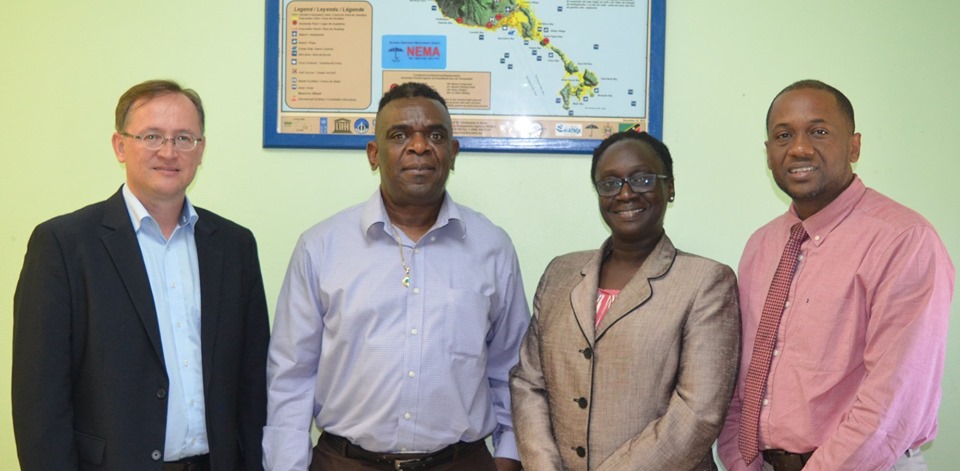As this year’s Atlantic Hurricane Season looms threateningly just beyond the Caribbean Sea, officials at the NEMA are in preparedness mode for what is referred to in Disaster Management circles as, War Time.
The predictions this year appear lame in comparison to seasons past, particularly 2017, when much of the Caribbean and parts of the USA, received moderate to devastating damage, with some countries still struggling through recovery and rehabilitation efforts.
NDC Abdias Samuel has warned against complacency, noting that it only takes one weather system to create destruction and disaster.
“Persons may be of the view that disasters only occur as a result of impacts of biblical proportions,” he said, “but under the right conditions, minimal hazards can trigger secondary impacts, eventually leading to devastation.”
Deputy National Disaster Coordinator (DNDC), Claricia Langley-Stevens said that mitigation has proven over the years, to one be of the agency’s strongholds.
“You will hear us often saying that the size of the agency’s staff is negligible,” she said, “But our greatest resources lay within our communities, our districts, our stakeholder groups and our volunteers. It is because of this cadre of supporters, that we are able as Disaster Managers to minimise impacts through education, preparedness and mitigation.”
NEMA’s road to resilience is currently receiving support following engagements with two major stakeholders. During the week of 28th April, 2019, Messrs. Christopher M. Ausdenmoore, Political/Economic Officer of the US Embassy and Yuri Peshkov, Programme Specialist for Culture, UNESCO Cluster Office for the Caribbean, met with the leaders of NEMA to discuss potential partnerships and opportunities for capacity building.
In the Federation for a short visit, NDC Samuel and DNDC Langley-Stevens hosted both officials at the NEMA, Lime Kiln.
Secretary General of the National Commission for UNESCO, Antonio Maynard, has shared that opportunities to source funding for resilience building, are available through UNESCO.
UNESCO has been an integral force in Disaster Management throughout the world and particularly, the Caribbean, by funding programmes and providing additional resources for training and exercise testing.
“Linking Culture to Disaster Management provides obvious connections between Preparedness, Response and Traditional observances and practices passed down through generations,” NDC Samuel said. “But it does not end there.”
“Ensuring there is a strong cultural presence in training can enhance collaboration between NEMA and communities, as well as the comprehensive development of sustainable plans.” Samuel stated. “Through the incorporation of experiences shared by elders and the encouragement of residents to buy into proposed plans by listening to their ideas, Culture can coincide with Disaster Management and they begin to speak in unison.”
DNDC Langley-Stevens introduced the SKN Comprehensive Disaster Management (CDM) Youth Ambassador Programme to the gathering, noting that the young members had already engaged in a humanitarian mission to the BVI, last year.
“These are young adults,” she said, “who are desirous of giving back to community and their peers, by committing themselves to Disaster Management, risk reduction and community resilience through the sharing of ideas and experiences.”
As a result, The Ambassadors will be exposed to an orientation at UNESCO’s Man and the Biosphere programme in St. Kitts-Nevis, to determine how their plans can be integrated into the goals and objectives of the project.
Launched in 1971, UNESCO’s Man and the Biosphere Programme (MAB) is an Intergovernmental Scientific Programme that aims to establish a scientific basis for the improvement of relationships between people and their environments.
MAB combines the natural and social sciences, economics and education to improve human livelihoods and the equitable sharing of benefits, and to safeguard natural and managed ecosystems, thus promoting innovative approaches to economic development that are socially and culturally appropriate, and environmentally sustainable.
In addition, NEMA also gained access to Satellite Phone Services via the intervention of Mr. Ausdenmoore on behalf of the US Embassy. The intervention came as part of an ongoing partnership, to build Resilience through preparedness and response, between the United States Embassy and the OECS, which includes St. Kitts-Nevis.

NDC Samuel receives a Satellite Phone on behalf of NEMA presented by Christopher Ausdenmoore, of the US Embassy.

NDC SAMUEL tours the NEOC with US Embassy’s Christopher Ausdenmoore.

NDC SAMUEL exposes Christopher Ausdenmoore of the Embassy of the United States of America to NEMA facility.

Touring the Warehouse at NEMA HQ with NDC SAMUEL Christopher Ausdenmoore.of the Embassy of the United States of America

St. Kitts Nevis CDM Youth Ambassadors arrive in the BVI in 2018, on their first humanitarian mission.
